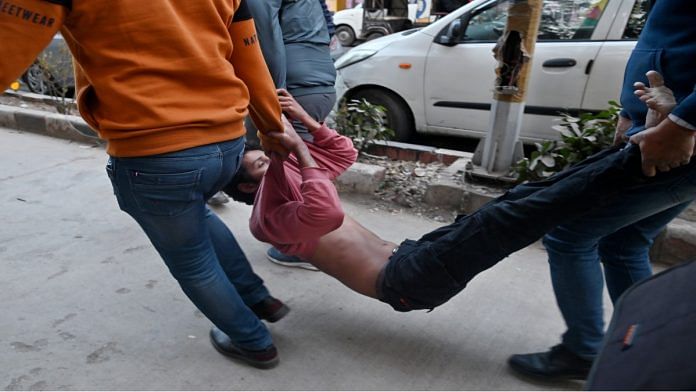New Delhi: Left-wing student organisations will hold fresh protests over the weekend against the detention of students involved in the screening of a BBC documentary critical of Prime Minister Narendra Modi’s role in the Gujarat violence, student leaders of Delhi University have told ThePrint.
Twenty-four students were briefly held by police at the Ambedkar University and Faculty of Arts, Delhi University, by police Friday. Section 144 too was imposed by the police in order to avoid large gatherings.
Earlier, 13 students of Jamia Millia Islamia University were detained Wednesday after they attempted to screen the film, while there were scuffles between rival student groups at Jawaharlal Nehru University.
A dramatic showdown took place in University of Hyderabad Thursday. When the CPI-M’s students’ wing, Students Federation of India (SFI) screened the BBC documentary, the Rashtriya Swayamsevak Sangh-affiliated Akhil Bharatiya Vidyarthi Parishad (ABVP) started the screening of Kashmir Files.
In Kolkata’s Jadavpur University, the screening was held peacefully Thursday. But the same day, Pondicherry University students had to resort to watching the documentary on their phones and laptops after the electricity and WiFi on campus were snapped.
The university reportedly had to call in the local police after a scuffle broke out between the SFI and ABVP students. The uproar was over Student’s Federation of India’s decision to screen the two-part documentary,‘The Modi Question’, in college/university campuses across the country as a mark of dissent.
The series allegedly takes a critical look at the rise of prime minister Narendra Modi through the ranks in the Bharatiya Janata Party and his alleged ‘silent’ involvement in the Gujarat riots of 2002 and the Delhi riots 2020. A week after the documentary was released in the UK on 17 January, unauthorised clips of the documentary started circulating in India and the Ministry of Information and Broadcasting issued a ban on it, while the Ministry of External Affairs called it a ‘propaganda’.
In her address to students Tuesday, JNU students’ union president Aishe Ghosh had insisted that the documentary is not banned from viewing. Abhigyan, the Delhi University president, in his statement Friday, said, “From JNU to Jamia, to (Ambedkar University Delhi) AUD to DU, we are witnessing a complete militarisation of educational campuses. The block on the documentary is a block on our right to free media and information. This police-led violence is an assault on our democratic campus. We just wish to tell this government that this documentary will reach all students of DU, despite their police, despite their goons.”
Such an uproar over a documentary raises questions about the nature of the ban and if students can publicly view the documentary.
Also read: Meet Dinesh Sharma, Bharat Jodo yatri who’s been barefoot for 12 years — ‘until Rahul is PM’
Ban by I&B ministry
The Ministry of Information and Broadcasting last Friday, using its emergency powers, used the Rule 16 of the Information Technology Act, 2021 and banned over 50 links of the video on YouTube and Twitter.
The rule states, “In case of emergency nature, the secretary, Ministry of Information and Broadcasting may, if he is satisfied that it is necessary or expedient and justifiable for blocking for public access of any information or part thereof through any computer resource and…as an interim measure issue such directions as he may consider necessary to such identified or identifiable persons, publishers or intermediary in control of such computer resource hosting such information or part thereof without giving him an opportunity of hearing.”
Within 48 hours of the rule being brought into effect, an officer in the ministry has to present the issue before a committee that needs to approve the ban. These orders can be passed when any content threatens the sovereignty, defence and public order of a nation.
However, people still have access to the video via other links and are able to watch the documentary on their personal devices. So are these people committing an offence?
Prateek Waghre, the policy director of Internet Freedom Foundation, a non-government organisation which advocates freedom of digital rights and liberties, said people who watch it in their personal spaces are not violating the above rule.
He said, “It may be a copyright violation but it is not an offence under the IT Rules. Previously, the government has invoked this rule to take down YouTube channels from primarily India and Pakistan, with content which they found may be violating the sovereignty of India. However, there is no explanation on whether this documentary can be classified as a violation of Indian sovereignty or an emergency.”
When it comes to screening of this documentary in a public place, such as university campuses, he said the offenders can be prosecuted under various sections of the Indian Penal Code. He said, “If the documentary is being aired in a university, the administration has a degree of discretion over allowing it. Thus if the university, or an individual, claims that the screening will lead to a disturbance on campus and raises a police complaint, it could be pursued.”
What campuses have to say
While the JNU administration did not issue any public statement on the incident earlier this week, Jamia Millia Islamia vice chancellor Najma Akhtar said in her statement Wednesday, “Nothing happened inside our university, an attempt was made but it was completely foiled. Whatever happened, happened on the streets. It was a small incident blown out of proportion. Our precautionary measures were good.”
The university also suspended classes on Friday.
DU proctor Rajni Abbi said she has written to Delhi Police on the matter, and they will take action. “We cannot allow the screening of the BBC documentary, as no permission was sought from the administration,” she said. Sources in Delhi University administration told ThePrint that they had not given permission to screen the documentary.
(Edited by Smriti Sinha)
Also read: Return of the Muslim: From Modi ‘sermon’ to Pathaan to Bharat Jodo Yatra



